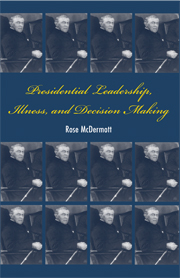Book contents
- Frontmatter
- Contents
- Acknowledgments
- 1 Introduction
- 2 Aging, Illness, and Addiction
- 3 The Exacerbation of Personality: Woodrow Wilson
- 4 Leading While Dying: Franklin Delano Roosevelt, 1943–1945
- 5 Addicted to Power: John F. Kennedy
- 6 Bordering on Sanity: Richard Nixon
- 7 The Twenty-fifth Amendment
- 8 Presidential Care
- Appendix: Foreign Leadership and Medical Intelligence: The Shah of Iran and the Carter Administration
- Notes
- Bibliography
- Index
Appendix: Foreign Leadership and Medical Intelligence: The Shah of Iran and the Carter Administration
Published online by Cambridge University Press: 24 May 2010
- Frontmatter
- Contents
- Acknowledgments
- 1 Introduction
- 2 Aging, Illness, and Addiction
- 3 The Exacerbation of Personality: Woodrow Wilson
- 4 Leading While Dying: Franklin Delano Roosevelt, 1943–1945
- 5 Addicted to Power: John F. Kennedy
- 6 Bordering on Sanity: Richard Nixon
- 7 The Twenty-fifth Amendment
- 8 Presidential Care
- Appendix: Foreign Leadership and Medical Intelligence: The Shah of Iran and the Carter Administration
- Notes
- Bibliography
- Index
Summary
Although the bulk of this study concerns the impact of medical and psychological impairment on the foreign policy decision making of U.S. presidents, another major way in which illness can impact American foreign policy occurs when leaders of foreign countries fall prey to illnesses. Their subsequent incapacitation can hold profound implications and consequences for American national and international security. Obtaining timely and accurate information on the health and welfare of critical allies and enemy leaders alike can prove helpful in inoculating American leaders from the often shocking virus of unanticipated revolution, leadership crisis, or state collapse.
In the interest of investigating the impact of foreign leader illness on American foreign policy, this appendix examines the notable case of the shah of Iran's illness and how the American government's ignorance of its severity produced a cascade of events that culminated in the holding of American hostages in the U.S. Embassy in Tehran. It proved a watershed in American-Iranian relations, from which the two countries have arguably still not recovered. This example serves to demonstrate the critical importance that medical intelligence can have in determining the direction of American foreign policy and points to the significance that such information can have in future threats and challenges.
MEDICAL INTELLIGENCE
Examples of governments going to great lengths to obtain medical information on foreign leaders abound. For example, the Israeli government obtained a urine sample from President Assad of Syria. What possible use might Israeli intelligence make of Assad's urine?
- Type
- Chapter
- Information
- Presidential Leadership, Illness, and Decision Making , pp. 243 - 262Publisher: Cambridge University PressPrint publication year: 2007



